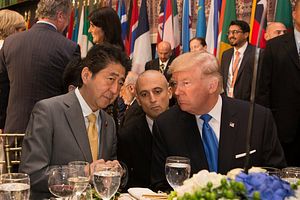From June 8 to 9, during the G7 Summit in Canada, Abe came to terms with another potential U.S. tariff hike — this time looming over Japan’s auto industry. Trump hinted at raising import duties on cars from 2.5 percent to a steep 25 percent, which is predicted to unleash more damage on Japan’s economy than the new U.S. metal import tariffs currently in effect.
At both bilateral talks in Washington and the G7 summit, Abe played down his reaction to Japan’s deteriorating economic trade relations with the United States while G7 leaders grilled Trump on the math behind the hike in steel and aluminum tariffs. Meanwhile, under the Trade Expansion Law the U.S. Commerce Department is currently considering whether or not to impose additional levies on imported cars, trucks, and auto parts. Top automobile exporters Mexico and Canada anticipate a pardon, leaving Japan and Germany to face the brunt of the levies.
Japan has a lot at stake, with its auto industry deeply invested in the United States. Since the 1980s Japanese automakers have expanded assembly plants in the U.S., producing almost 4 million cars annually. With 37 percent of Japanese car exports headed to the United States, punitive auto levies are expected to slice Japan’s GDP by 0.1 percent. Last year the U.S. imported $40 billion dollars worth of cars from Japan, compared to $20 billion from Germany.
Professor Shujiro Urata, an Asia-Pacific economist at Waseda University, says trading conditions between the two allies are regressing. He supports Japan imposing tariff retaliation through the WTO — a proposal Japan’s finance minister announced in May but has not formally lodged. However, Urata says contesting U.S. industrial safeguards covered under the pretense of national security would be a lengthy process.
The G7 summit saw Abe closely aligned with European leaders when he urged the need for free trade, which led to some redubbing the grouping the “G6 + America.” Abe declared that measures to restrict trade would not benefit any country and “we must not turn back the clock.” Despite vowing “to fight protectionism,” however, Abe avoided criticizing Trump and acted as his intermediary and wingman when the other global leaders joined forces to hound Trump for tariff concessions. While Abe sympathized with the anxieties caused by globalization, he also reframed Trump’s stance on the “inadequacies of the WTO” to highlight the need to strengthen its rules as soon as possible.
The European Union and Canada wasted no time announcing immediate tariff retaliation, reinforcing America’s deepening international isolation and a tumultuous geopolitical situation. The EU secretary of commerce stressed that at any point in time Trump has the authority to repeal or alter the trade tariffs. According to Urata, Trump doesn’t have an economic basis to pursue across the board trade restrictions, which reveals a political motivation.
Both Trump and Abe are gearing up for new bilateral talks on “fair, free, reciprocal” trade in July. But Trump’s high-pressure negotiating tactics have already begun. Urata says threats to impose auto tariffs could be leveraged as a way to gain access into Japan’s highly protected agriculture sector. In a resource-poor country like Japan agriculture is a politically sensitive topic and Abe may not win domestic support to liberalize the farming sector before the LDP’s internal party leader elections in September. Urata says a stand-off of “agriculture versus automobiles” is a losing deal that Japan should tiptoe around or stall.
Japan has been bombarded by its fair share of unilateral U.S. trade disputes. One year ago, Trump threatened a “big border tax” on Toyota if it moved U.S.-bound car manufacturing to Mexico. But unlike its European allies, Japan is also juggling its interests vis-a-vis North Korea — fending off nuclear threats, pushing denuclearization, and pressing the decades-old abduction issue thanks to the backing of the United States. In the meantime, separating Trump’s economic disputes from the security alliance is Abe’s political coping mechanism until regional threats are stabilized.

































